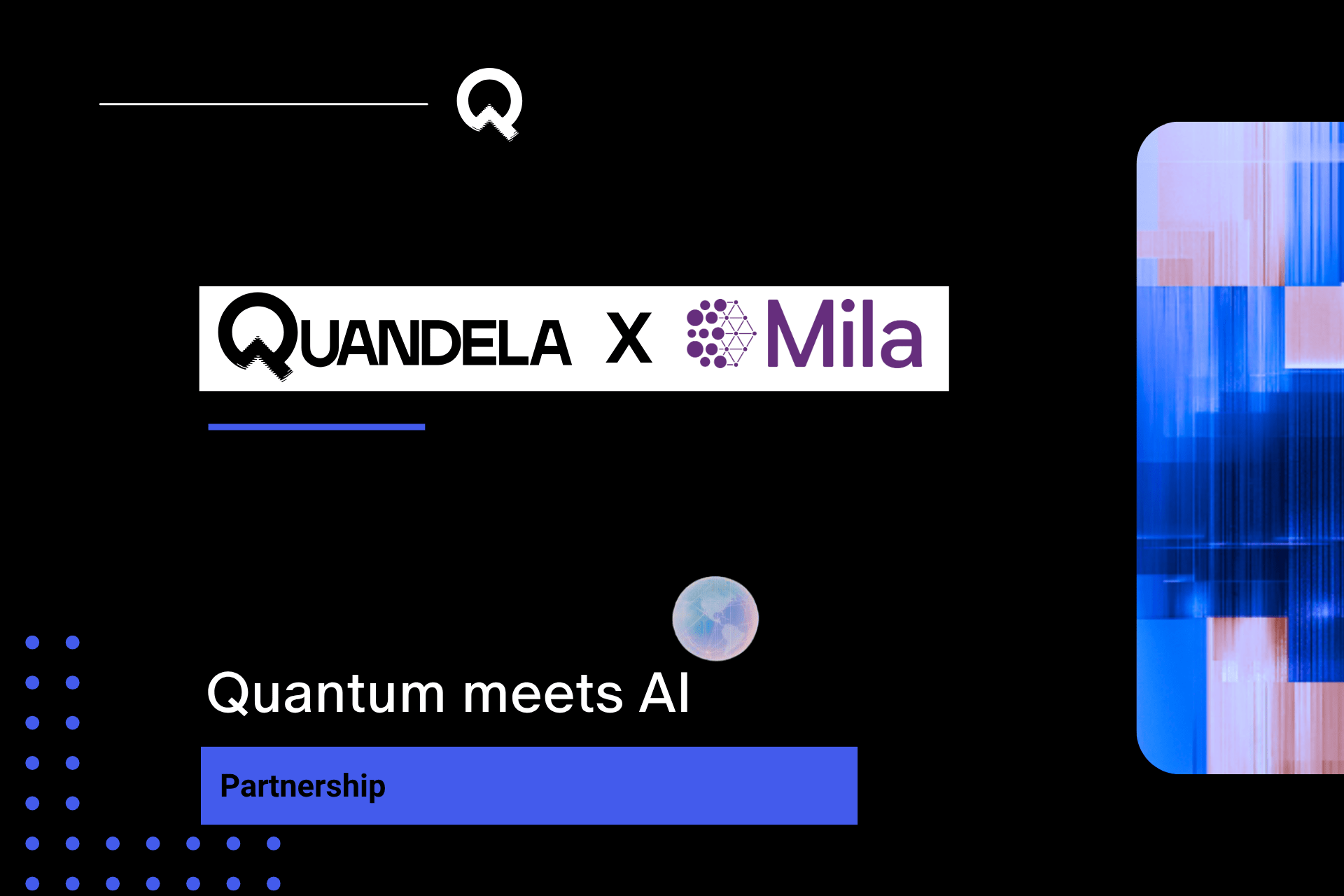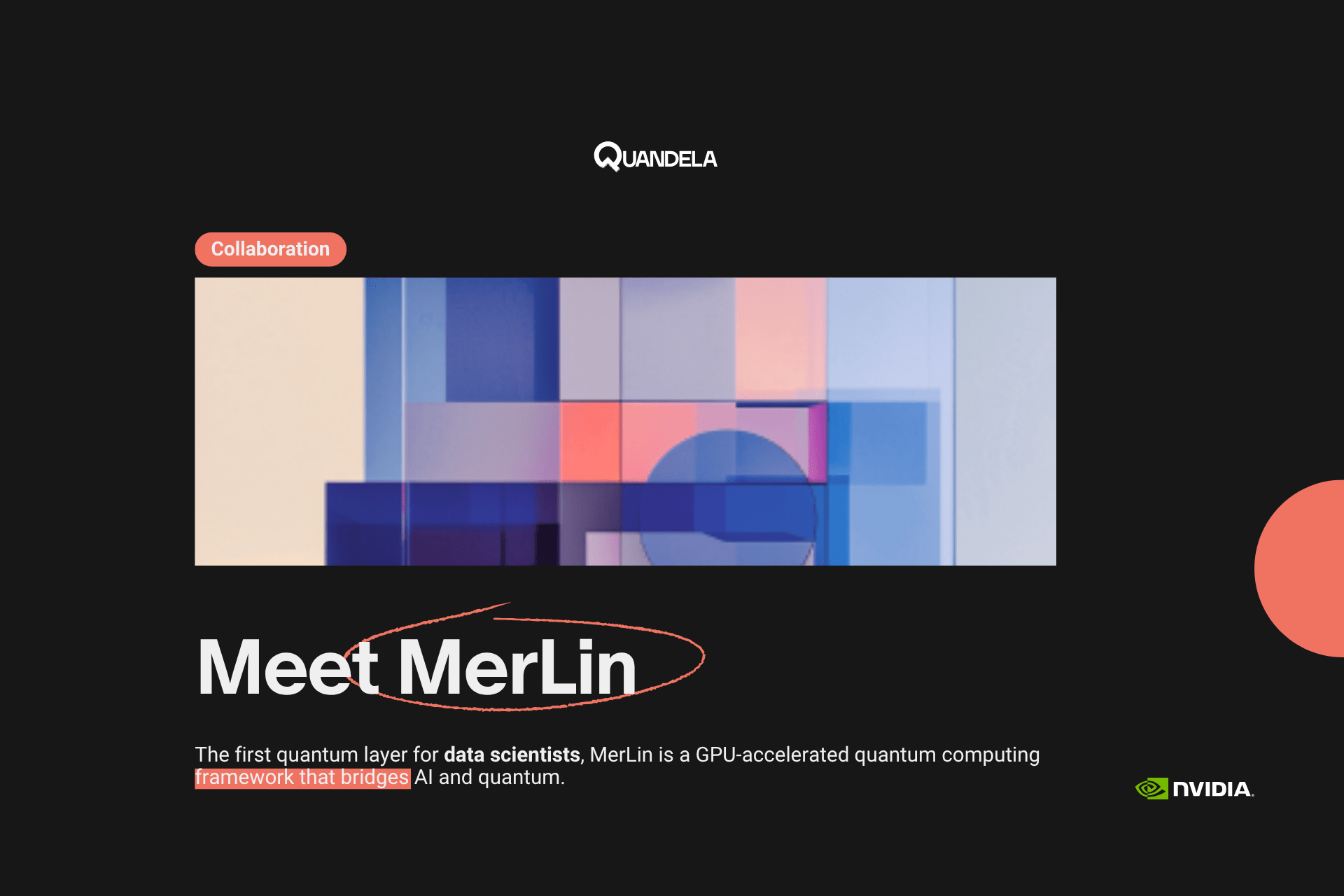The most exclusive Quantum ecosystem summit in Europe to drive innovation and collaboration. This gathering has united research labs, startups, and industry leaders, this summit is your opportunity to connect with key players from public and private sectors.
The most exclusive Quantum ecosystem summit in Europe to drive innovation and collaboration. This gathering has united research labs, startups, and industry leaders, this summit is your opportunity to connect […]

Explore More
Quandela and Mila join forces to develop hybrid artificial intelligence and quantum computing technologies. [French version below] Montreal, Quebec and Paris, France – July 8, 2025 – Quandela, a European […]
Quantum meets AI
×


Quandela and Mila join forces to develop hybrid artificial intelligence and quantum computing technologies. [French version below]
Montreal, Quebec and Paris, France – July 8, 2025 – Quandela, a European leader in photonic quantum computing, and Mila, the Quebec Artificial Intelligence Institute, announce a partnership to explore the potential of hybrid technologies combining machine learning and quantum computing.
This strategic collaboration will focus on the development and evaluation of innovative quantum machine learning (QML) models, positioning both organizations at the forefront of this new technological frontier.
“This partnership with Mila represents a crucial step in our mission to explore concrete applications of quantum computing in the field of artificial intelligence,” says Valérian Giesz, co-founder and COO of Quandela. “By combining our expertise in photonic quantum computing with Mila’s excellence in artificial intelligence, we are confident we can accelerate the development of solutions that will transform many sectors.”
“The intersection of artificial intelligence and quantum computing represents a field with great potential,” said Guillaume Rabusseau, Core Academic Member at Mila and Assistant Professor at the Université de Montréal. “Our collaboration with Quandela is an opportunity to explore how quantum approaches can enrich and potentially revolutionize current machine learning paradigms.”
Key objectives of the partnership
The collaboration between Quandela and Mila will focus on four main areas:
1.Benchmarking: Comparing the performance of quantum machine learning (QML) models on structured data against classical approaches.
2.Identifying quantum advantages: Determining under which conditions quantum methods can offer significant advantages in terms of accuracy, resource utilization and scalability.
3.Solving training challenges: Develop innovative solutions to overcome known challenges in training quantum models.
4.Experimental validation: Integrating both simulation-based studies and experiments on real quantum hardware to assess the potential of QML in real-world applications.
A stronger foothold in Canada
This partnership with Mila marks another step in Quandela’s expansion in Canada, following the recent installation of a quantum computer in Sherbrooke. This growing presence underscores Quandela’s commitment to actively contribute to the development of the Canadian quantum ecosystem, recognized worldwide for its excellence.
“The implementation of our quantum technology in Sherbrooke, followed by this partnership with Mila, illustrates our long-term vision for Canada,” emphasizes Valérian Giesz. “We are impressed by the vitality of the Canadian innovation ecosystem and determined to play a significant role in it.”
About Mila
Founded by Professor Yoshua Bengio of the University of Montreal, Mila is the world’s largest academic research center for deep learning, bringing together over 1,300 specialized researchers in machine learning. Based in Montreal and funded in part by the Government of Canada through the Pan-Canadian AI Strategy, Mila’s mission is to be a global center for scientific advancements that inspire innovation and the growth of AI for the benefit of all. Mila is a globally recognized non-profit organization for its significant contributions to deep learning, especially in the fields of language modeling, automatic translation, object recognition, and generative models. For more information, visit mila.quebec.
——————————————————————————
Quandela et Mila s’associent pour développer des technologies hybrides combinant intelligence artificielle et informatique quantique
Montréal, Québec et Paris, France – 8 juillet 2025 – Quandela, leader européen de l’informatique quantique photonique, et Mila, l’Institut québécois d’intelligence artificielle, annoncent un partenariat visant à explorer le potentiel des technologies hybrides combinant l’apprentissage automatique et l’informatique quantique.
Cette collaboration stratégique se concentrera sur le développement et l’évaluation de modèles d’apprentissage automatique quantique (QML) innovants, positionnant les deux organisations à l’avant-garde de cette nouvelle frontière technologique.
« Ce partenariat avec Mila représente une étape cruciale dans notre mission d’explorer les applications concrètes de l’informatique quantique dans le domaine de l’intelligence artificielle», déclare Valérian Giesz, cofondateur et directeur des opérations de Quandela. « En combinant notre expertise en informatique quantique photonique avec l’excellence de Mila en intelligence artificielle, nous sommes convaincus de pouvoir accélérer le développement de solutions qui transformeront de nombreux secteurs. »
« L’intersection de l’intelligence artificielle et de l’informatique quantique représente un domaine avec un très grand potentiel, » a affirmé Guillaume Rabusseau, Membre académique principal de Mila et Professeur adjoint à l’Université de Montréal. « Notre collaboration avec Quandela sera une occasion d’explorer comment les approches quantiques peuvent enrichir et potentiellement révolutionner les paradigmes actuels d’apprentissage automatique. »
Objectifs clés du partenariat
La collaboration entre Quandela et Mila s’articulera autour de quatre axes principaux :
1.Évaluation comparative : Comparer les performances des modèles d’apprentissage automatique quantique (QML) sur des données structurées par rapport aux approches classiques.
2.Identification des avantages quantiques : Déterminer dans quelles conditions les méthodes quantiques peuvent offrir des avantages significatifs en termes de précision, d’utilisation des ressources et d’extensibilité.
3.Résolution des défis d’entraînement: Développer des solutions innovantes pour surmonter les défis connus liés à l’entraînement de modèles quantiques.
4.Validation expérimentale : Intégrer à la fois des études basées sur des simulations et des expériences sur du matériel quantique réel pour évaluer le potentiel du QML dans des applications concrètes.
Un ancrage renforcé au Canada
Ce partenariat avec Mila marque une nouvelle étape dans l’expansion de Quandela au Canada, après l’installation récente d’un ordinateur quantique à Sherbrooke. Cette présence croissante témoigne de l’engagement de Quandela à contribuer activement au développement de l’écosystème quantique canadien, reconnu mondialement pour son excellence. « L’installation de notre technologie quantique à Sherbrooke, suivie de ce partenariat avec Mila, illustre notre vision à long terme pour le Canada », souligne Valérian Giesz. « Nous sommes impressionnés par la vitalité de l’écosystème d’innovation canadien et déterminés à y jouer un rôle significatif.»
À propos de Mila
Fondé par le professeur Yoshua Bengio de l’Université de Montréal, Mila est le plus grand centre de recherche universitaire en apprentissage profond au monde, rassemblant plus de 1 300 chercheur·euse·s spécialisé·e·s dans le domaine de l’apprentissage automatique. Basé à Montréal et financé en partie par le gouvernement du Canada dans le cadre de la Stratégie pancanadienne en matière d’IA, Mila a pour mission d’être un pôle mondial d’avancées scientifiques qui inspire l’innovation et le développement de l’IA au bénéfice de tous·tes. Mila est une organisation à but non lucratif reconnue mondialement pour ses importantes contributions au domaine de l’apprentissage profond, en particulier dans les domaines de la modélisation du langage, de la traduction automatique, de la reconnaissance d’objets et des modèles génératifs. Pour en savoir plus, visitez mila.quebec.
Paris – Saclay, June 17, 2025 AdvanThink, Europe’s leading expert in real-time payment fraud detection, and Quandela, a leader in quantum computing, have established a strategic partnership aimed at transforming […]
[VIVATECH] AdvanThink and Quandela demonstrate the ability to integrate Quantum Artificial Intelligence into proven payment fraud detection models
×
Paris – Saclay, June 17, 2025
AdvanThink, Europe’s leading expert in real-time payment fraud detection, and Quandela, a leader in quantum computing, have established a strategic partnership aimed at transforming the future of payment fraud prevention.
The Promise: By leveraging the complementary strengths of AI and quantum computing, the two companies aim to develop high-performance fraud detection models designed for real-world deployment. These systems will be capable of identifying payment fraud faster and with greater accuracy than existing solutions.
Detecting payment fraud in real time remains one of today’s most significant technological, operational, and strategic challenges. In response to constantly evolving fraud techniques, AdvanThink has spent 35 years building strategic tools powered by artificial intelligence that continuously learn and adapt to emerging threats. In this ongoing race to improve performance, artificial intelligence has become an essential tool, capable of detecting subtle warning signs across large volumes of data with unprecedented precision and speed.
Future requirements will be even more demanding. Fraud detection models will need to be faster, more accurate, more energy-efficient, and more resilient against increasingly sophisticated attacks. It is within this context that AdvanThink and Quandela have joined forces to explore the potential of quantum computing and push the boundaries of state-of-the-art fraud detection.
The first phase of this partnership will focus on developing a proof of concept that demonstrates the value of integrating quantum machine learning algorithms into AdvanThink’s industrial pipelines.
“For 35 years, AdvanThink has placed technological innovation at the heart of its development strategy. Quantum AI holds a significant promise when it comes to fraud detection. It serves as a powerful catalyst for innovation in building the secure payment solutions of tomorrow – and financial institutions need to begin acknowledging this transformation today. We have already successfully integrated Quandela’s technology into an AdvanThink pipeline, meeting all the requirements of an industrial-grade system ready for deployment. This first demonstrator holds great potential for experts in fraud detection,” says Brice Perdrix, CEO of AdvanThink.
“Quandela has already developed a quantum machine learning model that enhances credit risk assessment. The algorithm also shows strong potential in payment fraud detection. Quandela’s partnership with AdvanThink facilitates the integration of this model into an industrial workflow and enables benchmarking against the best products on the market,” adds Niccolo Somaschi, co-founder and CEO of Quandela.
Launching at GTC Paris, MerLin democratizes quantum machine learning by integrating with classical AI tools—backed by GPU-accelerated performance Paris, France – June 11th – Today, Quandela announces MerLin, a groundbreaking […]
MerLin Unveiled: The First Quantum Layer for Data Scientists, Optimized for NVIDIA Accelerated Computing
×
Launching at GTC Paris, MerLin democratizes quantum machine learning by integrating with classical AI tools—backed by GPU-accelerated performance
Paris, France – June 11th – Today, Quandela announces MerLin, a groundbreaking quantum computing framework designed for and by AI data scientists. Set to debut at NVIDIA GTC Paris, MerLin redefines quantum machine learning (QML) with a GPU-first approach, enabling researchers to simulate and benchmark algorithms beyond the limits of today’s quantum hardware.
Quantum Meets AI: A Collaborative Future
MerLin positions itself as the “quantum layer for data scientists” – contrasting with other quantum machine learning tools that target quantum scientists. By abstracting quantum complexity into familiar workflows (e.g., PyTorch/scikit-learn integrations), MerLin empowers AI practitioners to prototype hybrid quantum-classical models in hours, not months. Early adopters – including teams from the Perceval Quest, and researchers from Mila, NYUAD’s QML Lab and Scaleway – are collaborating with us to leverage MerLin and bridge classical and quantum workflows.
“Quantum shouldn’t demand a PhD to use,” said Niccolo Somaschi, co-founder & CEO of Quandela. “MerLin gives data scientists a GPU-accelerated gateway to quantum advantage while ensuring their work remains compatible with real hardware today—and tomorrow. By integrating benchmarks and noise-aware validation, we’re addressing a critical gap: the lack of reproducible metrics in hybrid algorithm research.”
“Powerful simulation tools are essential to develop better algorithms and accelerate the path to broad quantum advantage”, said Sam Stanwyck, Group Product Manager for quantum computing at NVIDIA. “MerLin solves a critical ecosystem need by opening the door for the broader research community to develop with photonic quantum circuits.”
Key Innovations
- GPU-Optimized Simulators:
- Leveraging NVIDIA CUDA-Q, MerLin delivers high-performance simulation for photonic quantum circuits, enabling tests for hardware that doesn’t yet exist (e.g., 24+ qubit systems).
- Benchmark-Driven Progress:
- MerLin establishes reproducible metrics for hybrid algorithms, addressing the “benchmarking gap” in QML research—where thousands of papers lack standardized comparisons.
- Integrated with Quandela Cloud, it enables immediate validation of GPU-optimized algorithms on real photonic hardware, studying noise impact and scalability.
- Targets pragmatic use cases like quantum-enhanced kNN, GANs, and variational algorithms—backed by hardware-aware compilation.
- Photonic-First, Future-Proof:
- Designed for today’s photonic QPUs (e.g., Perceval-based systems) but architected to adapt to next-gen hardware.
- Features like dynamic circuit recompilation ensure code scalability across hardware generations.
Who Uses MerLin?
- AI/ML Practitioners: Prototype quantum layers without rewriting classical pipelines.
- Quantum Researchers: Access photonic-specific tools (e.g., boson sampling) with GPU-accelerated simulation.
- Enterprises: Pilot hybrid quantum-AI workflows with clear ROI benchmarks.
“MerLin allowed us to adapt existing algorithms to a photonic-native format within a short timeframe. The platform offered useful comparative insights that contributed to our ongoing research and publication efforts”, said Dr. Louis Chen, an early user, Research Associate at the Quantum Centre of Imperial College London (Imperial QuEST) and participant in the most recent Perceval Quest.
Availability & Strategic Vision
MerLin will be freely accessible to accelerate adoption, with enterprise tiers for advanced features. The roadmap includes:
- Q2 2025: Stable PyTorch/scikit-learn APIs.
- 2026+: Support for 24+ qubit photonic systems.
Learn More: merlinquantum.ai



